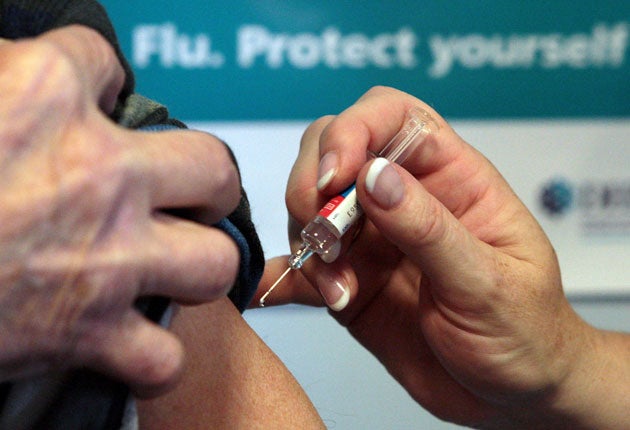Pressure on Lansley after critical flu cases double in a week
With hundreds in intensive care, Labour attacks minister's decision to axe vaccination campaign

Your support helps us to tell the story
From reproductive rights to climate change to Big Tech, The Independent is on the ground when the story is developing. Whether it's investigating the financials of Elon Musk's pro-Trump PAC or producing our latest documentary, 'The A Word', which shines a light on the American women fighting for reproductive rights, we know how important it is to parse out the facts from the messaging.
At such a critical moment in US history, we need reporters on the ground. Your donation allows us to keep sending journalists to speak to both sides of the story.
The Independent is trusted by Americans across the entire political spectrum. And unlike many other quality news outlets, we choose not to lock Americans out of our reporting and analysis with paywalls. We believe quality journalism should be available to everyone, paid for by those who can afford it.
Your support makes all the difference.The number of critically ill flu patients in England has more than doubled within a week, increasing pressure on Andrew Lansley, the Secretary of State for Health, to overturn his controversial decision to axe this year's public information campaign.
Doctors across the UK were last night treating nearly 500 flu patients in intensive care and high-dependency units, with England bearing the brunt of cases. In Scotland, 11 flu patients have so far been admitted to intensive care, and there have been no deaths. At least 27 people in England, including nine children, have died since October.
Medical experts warned that the NHS will struggle to cope because "shockingly" few vulnerable people and health professionals have so far been vaccinated. This winter's three dominant strains include last year's deadly H1N1 virus, which killed 423 people in the UK.
Almost half this year's deaths have been among vulnerable people who should have been vaccinated because they suffered from existing medical problems such as asthma, heart disease and diabetes. Only 43 per cent of younger "at-risk" people have so far been vaccinated, compared with nearly 49 per cent this time last year. Vaccination rates for those at risk in Scotland, where there has been a public awareness campaign, are higher.
Mr Lansley insists that the NHS can cope with the swelling numbers of sick patients, even though one in seven critical care beds are now occupied by flu patients.
The Christmas holidays will hamper efforts to increase vaccination rates as GP surgeries and most pharmacies are closed. Accident and emergency departments are bracing themselves for a hectic few days.
John Healey, the shadow Health Secretary, said: "We know the vaccine protects, and we know advertising works to boost take-up. With many more people at home watching TV and using online media over Christmas, this is the time to act... [Mr Lansley] made the wrong judgement."
The Royal College of General Practitioners (RCGP) told doctors on Friday to stop prescribing liquid Tamiflu to anyone except babies, amid fears that supplies would otherwise run out. However, Maureen Baker, the RCGP lead on health protection, said that there were enough vaccines in the supply chain nationally for all those patients who needed them.
Dr Baker last night added: "The sudden increase in infection rates in England over the last week or two has not been seen in the rest of the UK or in countries outside the UK ... I don't know why.
"We definitely need more people in vulnerable groups to be vaccinated, and if a public awareness campaign helps that, fine. Doctors are very busy but so far they are coping."
Mr Lansley said: "We will continue to monitor the situation and respond as necessary."
Join our commenting forum
Join thought-provoking conversations, follow other Independent readers and see their replies
Comments